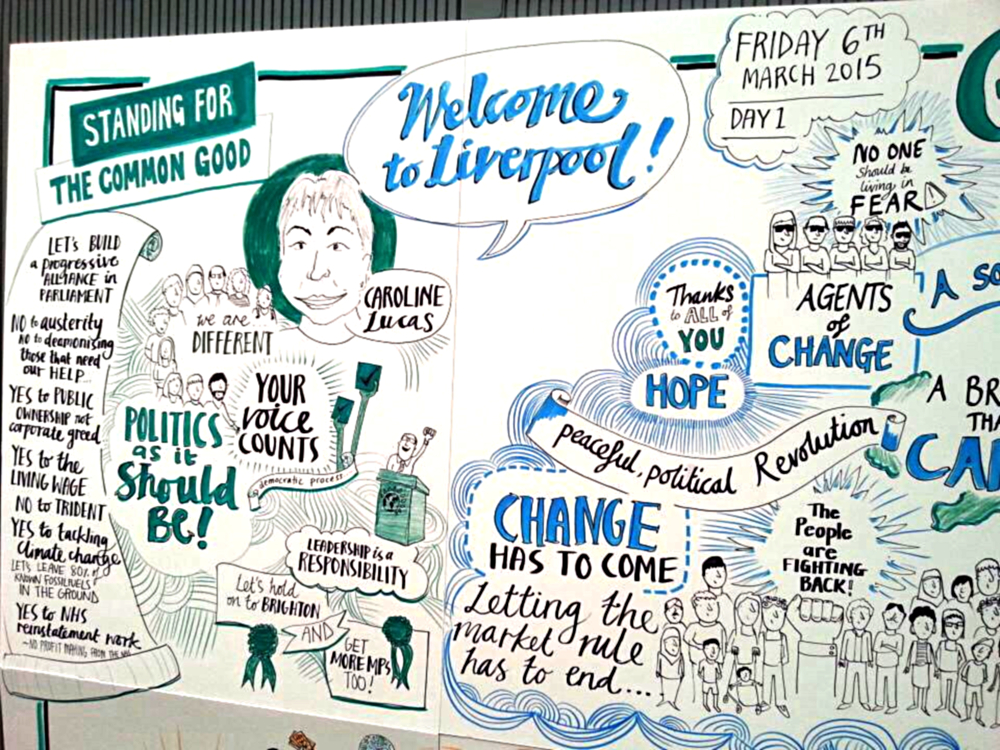#GPconf: A movement that unleashes people’s potential

Much has been said in the past few days, and not all of it entirely flattering, about the ways in which the Green Party is different from others in the UK political landscape. And no gathering shows that difference up more than party conference, where anyone is invited and everyone can have their say.
Much has been said too about Natalie Bennett and that LBC interview. Endless agonising (from the media mainly) has gone into whether she will redeem herself by nailing a good enough speech at the conference? Will she be supported or not by Caroline Lucas?
All this has the potential make a party hoping to gain political influence slightly nervous, especially when the right wing media is out to get us in their usual hyena-like ways.
But for me, all of those glitches and seeming imperfections are part of what makes the Green Party real and approachable and worthy of the trust of those people who really matter: the students who know that life is so complex that if you want to do everything you’re bound to get it wrong half the time; the single mothers (like me) who know that some days you can hardly keep your eyes open and your wits about you when you come home after a hard day’s work to find your child wants extra attention; the activists who care so much about the world that they forget to eat or go out and make friends; and generally all the people squeezed so hard by a system that’s plain wrong, that they simply cannot make ends meet, let alone keep up appearances. So a party that can look and sound human may be just what is needed to inject some common sense and energy into the rarefied atmosphere of professional politics.
The other and perhaps deeper lesson is that the Green Party looks the way it does because it has managed to take itself seriously enough to achieve not simply a measure of ‘diversity’, but is inching towards a philosophy of ‘liberation’ – which is way beyond that. The undercurrents of feminism, LGBTIQ rights and youth power that run right through the party can make it seem a bit chaotic. However, taken together, they make for a very exciting bunch of activists to be hanging out with, as well as for an incredibly solid party basis that is evidently growing every day.
All too often in politics, people talk about ‘equal opportunities’ and ‘gender balance’ or ‘diversity’ – when in effect, they mean things like ‘we will allow some women to squeeze into suits and up to the top table where they can battle it out on men’s terms’; or ‘we undertake to do no gay-bashing within our party if they manage to have orderly and long-term relationshisp’; or even ‘we will try to be nice and encouraging to young talent, nurturing younger people through internships so they may take their rightful place in the real world of politics when they are older and wiser and better adjusted’.
Better than nothing? I think not.
But there is a different way of operating, which is where traditionally oppressed groups, instead of asking for crumbs, decide that they can have real power within an organisation and make it their own. Doing things this way is a game changer. It is what the Green Party, consciously or not, has got right when it comes to women, LGBTIQ folk and young people, and is now reaping the benefits of in terms of energy and success in the polls.
When liberation replaces a timid quest for equality of opportunity or even diversity, much that we take for granted is turned on its head and everyone benefits more than they expected. When that line is crossed and we all seriously listen and learn from people very different from ourselves to the extent that we allow them to breathe a sigh of relief and take power, when we lift the burden off people who have been held back by our prejudices and have had to spend all their time carving out a space for themselves, what we discover is that of course our prejudices were just smokescreens that have held all of us back from realising our own potential. The rewards are multiple and the Green Party has been noticing them:
Instead of women nagging and ‘asking for their rights’, we have a party where women take the space they need for their minds to expand, unfettered and powerful, bringing with them all the deep wisdom of seasoned feminists who have been politically active throughout their lifetimes, and who will not give up whatever comes their way; when women no longer have to look over their shoulder in case a majority of defensive blokes are questioning their every thought, they can instead move ahead boldly and act; this way, women (and men) can concentrate on fighting the battle out there rather than the battle ‘inside the home’ as it were. The energy that this brings with it cannot be underestimated.
It is similarly refreshing when LGBTIQ activist can stop apologising for their sexual choices (something that I am sure they must find extremely tedious) and instead can get on with the business of questioning and challenging the status quo, building community and changing society; own their identity as a political as well as an individual choice. But beyond that, they see the Green Party an organisation where innovation and boldness are second nature to everyone rather than something to be admired in those of a creative disposition, where nobody thinks anybody is especially weird and we don’t have to be careful about who we are lest we don’t tow the line closely enough.
Last but not least, the Green Party has become an organisation where young people are where they should be – respected, strongly and visibly in the lead, yet backed by their older comrades every step of the way; where being young doesn’t mean you have to cheer up the atmosphere while being told that you will ‘grow out of it’ and become jaded like the rest of us; an organisation where the default position is to be enthusiastic and driven and idealistic and where people believe that things can and indeed will be different (as has always been the case throughout history, just that those of us over 40 tend to forget it).
So are women, LGBT folk and young people the reasons for the Green Surge? Perhaps.
But I don’t want us to forget those Green party members who have majorly contributed to that growth by in some small way stepping aside or back or sideways, but sticking with the cause – the men who have agreed to be led by women and are supporting them every step of the way; those of us who are straight but dare to consider that we may be the anomaly rather than the norm; and those of us who are getting older but know that the best is yet to come in our lives as well as in politics.
Of course, we need to and we do remember that there are some areas where we have not made big enough strides yet: the Green Party is still much too white and overwhelmingly middle-class. There is work to be done, but as the fringe event on Winning the Black vote showed, it really is just work and we know how to do it.




Hi Violeta,
I’m afraid I can’t agree with this article. The number of people I know who have felt personally excluded or stigmatised by people acting in a Green Party capacity is in the double figures, and in these cases their involvement has been curtailed before they would ever tend to show up to a conference. They are overwhelmingly women, with disabilities and/or non-white, and in many cases have been turned off politics altogether by the party’s behaviour.
I have seen the Scottish Green Party trumpet its inclusiveness and progressiveness many times. I have rarely seen it put these ideals into practice. The party has no safe space policy, no rigorous complaints procedures and no real understanding of the level of exclusion it is promoting. You are in no position to pat yourself on the back. You should stop doing so.
Hi Alastair, thank you for pointing out these deficiencies in the Green Party’s practice when it comes to inclusiveness. Before I reply to your comment, can I just say that my article relates to the Green Party of England and Wales only. Please see below on what action Bright Green has taken in regard to the concerns you raise re the Scottish Greens.
I wrote the article based on my own personal experience as a woman and an Eastern European immigrant, and on many discussions with young people and LGBTIQ people. I am willing to concede that it is my own perception of the matter and I am aware that others may have had a different but equally valid experience. Having said that, I agree with you that within the Green Party of England and Wales we have a long way to go on real diversity, especially (as you mention) when it comes to including people with disabilities and people of a BAME background. In fact, I refer to this at the end of my article as I think it’s important to keep working on these issues. I was pleased to see that the GPEW Spring Conference passed an ‘Enabling Motion for an Equality and Diversity Chapter’ (C7). It acknowledges that some aspects of our Equality and Diversity policy are still missing and need to be addressed. I hope that this will lead to better policies and even more importantly, practices within the party. Nevertheless, I believe it’s important that we notice where the party has done well and is leading the way in the political landscape.
As for your concerns related to the Scottish Green Party, Bright Green has been passed these on to the Scottish Greens’ office bearers who have confirmed they will raise these issues and call for action to be taken.
Hi Robert, it was really good to read your comment and it has given me a lot of food for thought, so apologies for the belated reply.
I do agree with you that there is quite a lot we haven’t yet got right when it comes to diversity within the Green Party. I think one thing that would help is if those of us who come from traditionally oppressed groups (women, immigrants, young people, LGBTIQ folk, black and minority ethnic members) spoke up more about our specific experience and the specific ways in which we have been helped to get involved. In this way, we would be more easily understood when we ask for seemingly meaningless ‘politically correct’ ways of behaviour from others. In fact, I don’t really believe it political correctness for its own sake, or rather I don’t believe in the value of someone like you changing your outward behaviour (such as not saying ‘lady’ or ‘gentleman’) unless you understood from personal experience why you would want to change your behaviour and did so because your conscience dictated it.
For example, in my mother tongue (which is Romanian), I never use the word ‘tzigan’ to denote a Roma person, because I know that this word comes from the historical term ‘atinganoi’ which meant ‘untouchable’ in the Byzantine empire and is associated with slavery. But unless I had thought long and hard about my motives, I would not be able to explain to someone else why I use that word.
On your other concern – I don’t think the Green Party offers leadership positions to young people or women (or any other group for that matter) just for being from that background. Rather, when selecting people for Green Party office (eg Deputy Leader) we have policies that offer people a choice of candidates from different backgrounds, so that people CAN vote for a woman or a young person if they think he/she is the right person for the job. In that way, it’s like offering the wider electorate a choice of candidates at the polling stations – people should have the choice of voting for a Green Party candidate – hence our policy of standing candidates in as many constituencies as possible.
Does this make sense?
Once again, thank you
Violeta
Hi Violeta
Thanks for your thoughtful reply.
After writing the above comment I actually went and raised some of the issues I mention in the Conference Feedback session today (or heard them raised and discussed by others) and saw how the party (mostly) does its best to learn from these sort of issues. Democracy in action, and it was impressive!
All the best
Robert
Thanks for that, Violet. Here’s my own take on the conference, from a new member and first-time attendee (yesterday, Saturday, was my first day.)
First of all I should say that the Greens seem to have a marvellous set of people and policies, and are the only party in Britain standing up for real positive change to the status quo. So I hope any criticism will be construed as constructive.
I think the issues of gender balance, non-sexism, non-ageism and so on are clearly ones that matter to the party, and rightly so. But at times it is in danger of bending over backwards in order to be seen to be non-prejudiced. For example, sometimes people are picked or not picked to speak in a meeting because of their perceived gender, in an effort to achieve gender balance. Fair enough, I suppose, if applied fairly. But in another case, the chair of the plenary (Jenny Jones) was reprimanded for using “sexist language” by referring to “the gentleman” or “the lady” when calling on people from the floor — leaving her reduced to saying things like “the person in green” which was, frankly, risible and not helpful to anyone. There really needs to be a consistent and workable practice on this sort of thing, not just an embarrassed muddling through.
The same applies to promoting people just because they are a woman or a young person or an ethnic minority. Sorry, but I just don’t believe in it, and if you think that’s a reflection of my unconscious privilege as a white, middle-class male, well maybe so. I’m very happy that the majority of prominent leaders in the Greens are women, but I’m definitely not proud of the fact that they are there because the policy is that a certain number of the leaders have to be women. Really, they should be there because the culture of the party is supportive of women (and of men); and from what I’ve seen, it is, which is great. But you’re either gender-neutral or you aren’t; you can’t both be and not be it!
Speaking of embarrassed muddling through, the plenary proceedings didn’t seem to me an effective way of making policy. Motions to modify the party’s fundamental policy documents were passed on little debate, simply because there were so many to get through. In some cases the chair and the standing order committee representatives struggled to understand what was actually being voted on, never mind the members on the floor. The chair could hardly see many of the people who were wishing to speak, and they were called entirely based on whim. Many of the motions were not well expressed. One had been wrongly titled (with humorous intent which backfired) “Removing our policy to ban all cars”, which has caused the party considerable embarrassment in the press. (It’s been misquoted by John Crace in the Guardian (http://www.theguardian.com/politics/2015/mar/06/natalie-bennett-green-pary-conference) who has Matthew Butcher saying ““I should also add that the priority motion calling for all cars to be banned isn’t actually a priority.”)
And what about the much more serious, yet unmentioned, bias against members who were financially unable to attend the conference in person? The conference, doubtless, is more white and middle-class than the party as a whole. In the age of Wikipedia, surely it should be possible to find a more flexible and responsive way of making policy; perhaps a hybrid of the internet to prepare and pre-debate alternative motions, so that real debate can take place on the conference floor and we aren’t reduced to byzantine amendments?
I hope this is taken in the spirit in which it is meant. Thanks to everyone for their hard work putting the conference together, really it was very good!